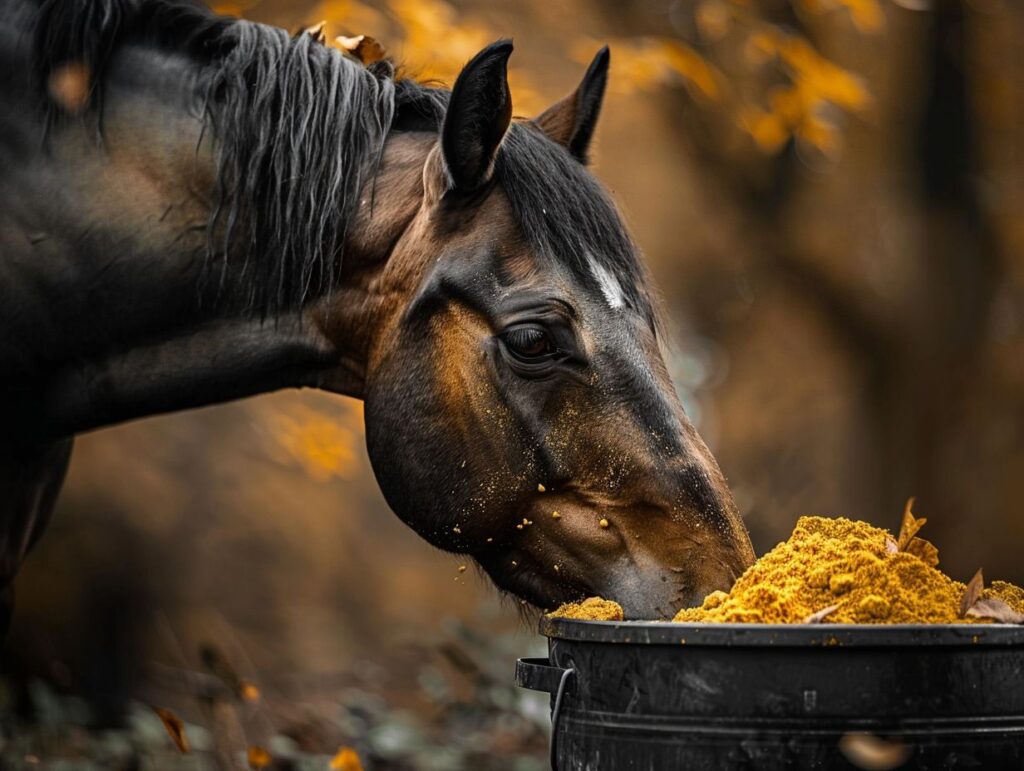Interested in using turmeric for your horse but unsure of where to begin? Everything you need to know about this popular supplement will be broken down for you, from its benefits to the recommended dosage.
Various methods of administering turmeric to horses will also be discussed, along with potential side effects to be mindful of.
Be sure to stay tuned for tips on effectively and safely choosing and using turmeric for your equine companion.
Understanding Turmeric for Horses

Understanding Turmeric for Horses involves exploring its various health benefits and how it can positively impact equine well-being. Turmeric, a natural remedy known for its anti-inflammatory properties, has gained popularity in the equine community for promoting overall health and healing.
This powerful herb not only helps in managing joint pain and stiffness in horses but also supports digestive health, making it a versatile supplement for equine care. Turmeric’s antioxidant properties work to combat oxidative stress and boost the immune system, enhancing the overall resilience of horses. By incorporating turmeric into their diets, horse owners can take a holistic approach to wellness, focusing on natural remedies that support the body’s innate healing processes.
What is Turmeric and its Benefits?
Turmeric, a vibrant yellow powder derived from the Curcuma longa plant, is renowned for its wide array of health benefits. The active compound found in turmeric, curcumin, possesses potent medicinal properties that underlie its efficacy as a natural remedy for a multitude of health conditions.
You can leverage turmeric’s antioxidant and anti-inflammatory properties, which have been harnessed for centuries in traditional medicine. Its notable benefits include aiding digestion, bolstering immune system function, and promoting overall well-being. This adaptable spice serves as a fundamental ingredient in culinary creations and is a popular supplement choice due to its diverse health-promoting effects. Turmeric’s plant-based origins position it as a highly sought-after natural alternative for individuals interested in holistic approaches to maintaining health and wellness.
Recommended Dosage of Turmeric for Horses
Determining the recommended dosage of turmeric for your horses is essential for ensuring their optimal health and well-being. By administering turmeric in the correct amounts, you can maximize its benefits and support your equine’s overall wellness.
Factors such as your horse’s weight, age, and health condition play a crucial role in determining the appropriate dosage of turmeric. It is important to take these key variables into account to customize the supplementation to suit your horse’s specific needs.
Experts in equine nutrition advise assessing your individual horse’s requirements before establishing a dosage plan, as both overdosing and underdosing can result in ineffective outcomes. Understanding the absorption rates of turmeric in horses is critical to ensure that the supplement is efficiently utilized by your horse’s body for optimal health benefits.
Factors Affecting Dosage
When determining the optimal dosage of turmeric for your horses, several factors come into play. Considerations such as your horse’s weight, age, current health condition, and overall wellness regimen are critical in calibrating the appropriate amount of this plant-based medicine.
Weight stands as a crucial factor in calculating the turmeric dosage because it directly impacts how your horse metabolizes and absorbs the active compounds. Generally, heavier horses may necessitate slightly higher doses to achieve the same benefits as lighter ones.
Age is also a significant factor to consider, as younger horses may have higher metabolic rates, affecting how turmeric is absorbed. Monitoring your horse’s health status closely is essential, as underlying health conditions can influence the body’s response to turmeric, thus affecting the required dosage for optimal results.
How to Administer Turmeric to Horses

When administering turmeric to horses, you can utilize various methods to maximize its effectiveness. One approach is to include turmeric supplements in the horse’s diet or daily routine to promote their well-being and provide essential health advantages.
An effective method to introduce turmeric to a horse is by combining it with their daily feed. This technique enables the easy consumption and absorption of turmeric’s beneficial properties. Designing herbal turmeric supplements customized to the horse’s specific requirements can ensure a regular intake of this potent herb. Consistency is crucial when integrating turmeric into the horse’s wellness regimen to enhance its potential therapeutic benefits and support overall health.
Methods of Administration
There are several effective methods for administering turmeric to your horses, ranging from adding it to their feed to creating specialized supplements. The choice of administration method plays a crucial role in ensuring your horse receives the recommended dosage for optimal health management.
Another popular way to give turmeric to your horses is by mixing it with honey or molasses, creating a tasty paste that can be fed directly to the horse. This method not only helps mask the taste of turmeric but also ensures that your horse consumes it without any reluctance.
Turmeric can also be infused in your horse’s drinking water, providing a convenient way to administer the supplement daily. Regular dosing of turmeric is essential to maximize its benefits in promoting overall wellness and supporting your horse’s natural immune system.
Potential Side Effects of Turmeric in Horses
Understanding the potential side effects of turmeric in horses is essential for proactive health management. While turmeric offers numerous benefits, it is crucial for you to be aware of any possible adverse effects on equine health and well-being.
Some horses may experience digestive upset when consuming turmeric, such as diarrhea or colic. Turmeric can potentially interact with certain medications, impacting their effectiveness. Monitoring your horse’s response to turmeric closely and consulting with a veterinarian if any signs of discomfort or abnormal behavior arise is paramount.
Remember that, as with any traditional remedy, moderation is key, and it is particularly important when considering the impact on liver health in horses. Excessive turmeric intake may strain this vital organ, underscoring the need for caution and vigilance in your horse’s dietary choices.
Recognizing and Managing Side Effects
Recognizing and effectively managing the side effects of turmeric in horses is crucial for maintaining their overall health and well-being. Monitoring for any signs of discomfort or adverse reactions can help address issues promptly and ensure the horse’s wellness.
It is essential for you to be observant of changes in behavior, digestive disturbances, or skin issues once turmeric is introduced into your horse’s diet. Some horses may experience gastrointestinal upset, such as diarrhea or colic, as a side effect of turmeric consumption. In such cases, reducing the dosage or temporarily discontinuing its use may be necessary.
Holistic approaches, such as supplementing with probiotics or altering the method of turmeric administration, can aid in minimizing these effects and supporting the horse’s digestion. Seeking advice from a veterinary professional before administering turmeric to horses with existing conditions like arthritis or inflammation can ensure a tailored and safe approach to incorporating this supplement into their health regimen.
Tips for Choosing and Using Turmeric for Horses

When selecting and using turmeric for your horses, you need to pay close attention to quality and safety in order to maximize its benefits. Ensuring the quality of the turmeric and adhering to safe practices in its utilization can have a positive impact on your equine’s joint health and overall well-being.
In your quest for high-quality turmeric for horses, it is essential to look for organic and pure forms that are free from additives or contaminants, as these can potentially diminish the effectiveness of the supplement. Opting for plant-based supplements offers a natural and gentle way to support your horse’s health.
To introduce turmeric into your horse’s diet safely, it is recommended to start with small amounts and gradually increase the dosage while monitoring for any adverse reactions. Observing your horse’s response and seeking guidance from a veterinarian can help in customizing the turmeric dosage to best meet your horse’s individual requirements.
Quality and Safety Considerations
Regarding choosing and using turmeric for your horses, prioritizing quality and safety should be your top concern. Opting for high-quality, safe turmeric products can significantly enhance the health support and overall wellness of your equine companions.
Turmeric is renowned for its anti-inflammatory and antioxidant properties, which can be beneficial in maintaining your horse’s joint health and immune system. By incorporating turmeric into your horse’s diet, you can provide natural herbal supplementation that supports their overall health maintenance. It is crucial to procure turmeric from reputable suppliers to ensure its purity and potency, thereby avoiding potential harmful additives or contaminants. Proper dosing and monitoring are essential to maximize the benefits of turmeric for your horses without compromising their well-being.
Frequently Asked Questions
How Much Tumeric should I give my Horse?
The amount of tumeric you should give your horse depends on their weight. As a general rule, 1 to 2 tablespoons per day is recommended for horses weighing 1000 pounds or more. However, it’s always best to consult with your veterinarian for the exact dosage for your horse.
Can I give my Horse too much Tumeric?

Yes, giving your horse too much tumeric can have negative effects. While tumeric is generally safe for horses, large amounts can cause gastrointestinal upset and may interfere with blood clotting. It’s important to always follow the recommended dosage and consult with your vet if you have any concerns.
How do I administer Tumeric to my Horse?
Tumeric can be given to horses in various forms such as powder, capsules, or paste. It can also be added to their feed or mixed with molasses for easier consumption. Whatever form you choose, make sure to slowly introduce tumeric to your horse’s diet and monitor their reaction.
Are there any benefits to giving my Horse Tumeric?
Yes, tumeric has numerous benefits for horses. It has anti-inflammatory properties that can help with joint pain and stiffness. It also supports digestive health and can improve the coat and skin condition of horses. Additionally, tumeric has antioxidant properties and can boost the immune system.
Can I give Tumeric to my Pregnant or Nursing Horse?
It’s best to avoid giving tumeric to pregnant or nursing horses as its effects on the fetus or foal are not fully understood. If your horse is pregnant or nursing, consult with your vet before adding tumeric to their diet.
What should I do if my Horse has an adverse reaction to Tumeric?
If your horse experiences any negative reactions after consuming tumeric, such as diarrhea or colic, stop giving it to them immediately and consult with your vet. It’s possible that your horse may have an allergy or sensitivity to tumeric, and your vet can advise on the best course of action.


